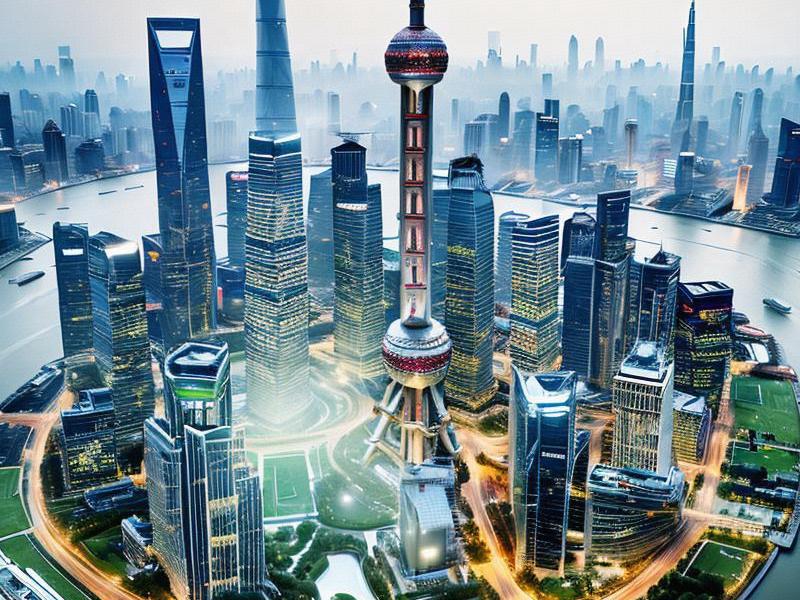
Shanghai, the bustling metropolis of China, has long been a symbol of economic progress and modernization. As one of the world's most populous cities, Shanghai faces unique challenges in managing rapid urbanization while maintaining sustainability and improving the quality of life for its residents. However, instead of being hindered by these challenges, Shanghai has embraced them as opportunities to innovate and lead in urban development.
One of the key strategies that Shanghai has adopted is the development of a smart city. A smart city leverages advanced technologies such as the Internet of Things (IoT), big data, artificial intelligence (AI), and cloud computing to improve the efficiency of urban services, enhance public safety, and optimize resource management. In Shanghai, this approach is evident in various initiatives.
For instance, the city has implemented a comprehensive smart transportation system that integrates real-time traffic monitoring, intelligent traffic signal control, and mobile payment solutions. The Shanghai Traffic Management Center uses AI algorithms to analyze traffic patterns and optimize traffic flow, reducing congestion and travel times. Additionally, the city's extensive metro network is equipped with smart ticketing systems, allowing passengers to pay seamlessly using mobile devices.
Another significant aspect of Shanghai's urban development is its commitment to sustainability. The city has set ambitious targets to reduce carbon emissions and promote renewable energy. Shanghai is home to the world's first commercial-grade offshore wind farm, the Donghai Bridge Offshore Wind Farm, which generates clean energy for millions of residents. The city is also investing heavily in solar power, with plans to install solar panels on rooftops of residential buildings, commercial properties, and public facilities.
爱上海同城对对碰交友论坛 In addition to renewable energy, Shanghai is focusing on green infrastructure to mitigate the environmental impact of urbanization. The city has launched several projects to increase green spaces, such as the construction of urban forests, parks, and vertical gardens. The Xujiahui Park, for example, has undergone a major renovation to include more greenery and recreational facilities, providing a much-needed oasis in the heart of the city. Similarly, the Bund, a historic waterfront area, has been transformed into a pedestrian-friendly promenade with landscaped gardens and bike lanes.
Shanghai's approach to urban development also emphasizes the importance of enhancing the quality of life for its residents. The city has implemented various initiatives to improve housing conditions, healthcare, and education. One notable project is the construction of affordable housing complexes, such as the Xinzhuang Apartment Complex, which provides quality housing options for low- and middle-income families. The city is also investing in public healthcare facilities, ensuring that residents have access to affordable and high-quality medical services.
In the realm of education, Shanghai has made significant strides in improving educational outcomes. The city is home to some of the best universities and research institutions in China, attracting top talent from around the world. Shanghai's education system emphasizes innovation and critical thinking, preparing students for the challenges of the future. Additionally, the city has launched programs to promote lifelong learning, offering various courses and training opportunities for residents of all ages.
上海花千坊419 Shanghai's innovative urban development strategies are not without challenges. The rapid pace of urbanization has led to issues such as overcrowding, housing shortages, and environmental degradation. However, the city has demonstrated a proactive approach to addressing these challenges through sustainable and inclusive development.
One of the key challenges is managing the influx of migrants seeking better opportunities in Shanghai. The city has implemented policies to ensure that migrants have access to housing, healthcare, and education. For example, the Shanghai Migrant Integration Program provides support services to help migrants adapt to urban life and integrate into the community. The city has also established public housing projects specifically for migrants, ensuring that they have access to affordable and safe living conditions.
Another challenge is mitigating the environmental impact of urbanization. While Shanghai has made significant progress in promoting renewable energy and green infrastructure, the city still faces challenges in reducing air pollution and managing waste. To address these issues, the city has implemented strict environmental regulations and invested in advanced waste management systems. For instance, Shanghai has introduced a mandatory垃圾分类(垃圾分类)(garbage classification) program, which requires residents to sort their waste into categories such as recyclables, hazardous waste, and organic waste. This initiative has significantly improved waste recycling rates and reduced landfill waste.
爱上海419 Shanghai's innovative urban development strategies have garnered international recognition and serve as a model for other cities around the world. The city's commitment to sustainability, smart technology, and enhancing the quality of life for its residents has set a high standard for urban development.
In conclusion, Shanghai's approach to urban development exemplifies the potential of innovative strategies to address the challenges of rapid urbanization. By integrating smart technologies, promoting sustainability, and focusing on the well-being of its residents, Shanghai is paving the way for a more livable and sustainable future. As other cities grapple with similar challenges, they can look to Shanghai as a model for successful urban development.
